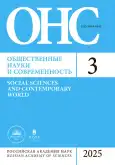The Objective and the Subjective in the UK Anti-Russian Policy
- 作者: Aleshin A.A.1
-
隶属关系:
- Primakov National Research Institute of World Economy and International Relations of Russian Academy of Sciences (IMEMO RAS)
- 期: 编号 3 (2025)
- 页面: 20-33
- 栏目: International relations
- URL: https://journals.eco-vector.com/0869-0499/article/view/691339
- DOI: https://doi.org/10.31857/S0869049925030021
- EDN: https://elibrary.ru/kagpsy
- ID: 691339
如何引用文章
详细
The article raises the problem of the influence of objective factors on the positions of the national political elite using the example of the UK foreign policy towards Russia. Methodology is based on Soviet and Russian theoretical developments on the relationship between the objective and the subjective in international relations. Using a systemic historical approach and applied political economic analysis, the author identified and studied objective factors such as structural conditions of the world economy and international relations, the position of the UK in them, reflected in the subjective approaches of the party and political elites in Britain. Among them are: foreign economic, foreign policy, socio-economic and military-economic factors. Party political approaches in the context of the 2024 UK parliamentary elections were studied using qualitative content analysis. A comparison is made between the parties’ approaches to interaction with Russia, and the common and the different are highlighted. It is substantiated that the above-mentioned objective factors influence the political space of the UK within which party leaderships formulate their strategies. They are the basis for the UK anti-Russian policy, a long-term basis that mediated the formation of the corresponding foreign policy identity of the British political elites. The research showed that these factors mediated the gradual degradation of Russian-British relations since the mid-2000s. The conclusion is that every British government in the medium term, and probably in the long term, will pursue an anti-Russian policy, but its methods and intensity may differ depending on a particular party ideology.
作者简介
A. Aleshin
Primakov National Research Institute of World Economy and International Relations of Russian Academy of Sciences (IMEMO RAS)
编辑信件的主要联系方式.
Email: aleshin.a@imemo.ru
Moscow, Russia
参考
- Aleshin A.A. (2023) Velikobritaniya – Evrosoyuz – NATO: reorganizatsiya «transatlanticheskogo prostranstva bezopasnosti» [Britain – the European Union – NATO: Reorganization of the «Transatlantic Security Space»]. M.: Aspect Press. 317 p. (In Russ.)
- Voitolovsky F.G. (2007) Edinstvo i razobshchennost' Zapada. Ideologicheskoe otrazhenie v soznanii ehlit SSHA i Zapadnoi Evropy transformatsii politicheskogo miroporyadka 1940-e – 2000-e gg. [Unity and disunity of the West. Ideological reflection in the consciousness of the elites of the United States and Western Europe of transformations of the political world order in the 1940s – 2000s.] M.: Kraft+. 454 p. (In Russ.)
- Godovanyuk K.A. (2020) «Global’naya Britaniya» v preddverii brekzita [«Global Britain» on the eve of Brexit»]. M.: Institute of Europe RAS. 160 p. (In Russ.) https://doi.org/10.15211/report62020_373
- Godovanyuk K.A. (2024) Defense against Foreign Interference: The Two-Tier Logic of UK Foreign Policy Shaping. Comparative Politics Russia, 15(4). Pз. 155–171. (In Russ.) https://doi.org/10.46272/2221-3279-2024-4-15-9
- Kosolapov N.A. (1992) Foreign policy consciousness: category and reality. World Economy and International Relations, №. 9. Pp. 5–17. (In Russ.) https://doi.org/10.20542/0131-2227-1992-9-5-17
- Kosolapov N.A. (2007) Spatial-organizational approach to the analysis of international realities. International Trends, № 3 (15). Vol. 5. Pp. 57–65. (In Russ.)
- Osnovy Teorii Mezhdunarodnykh Otnoshenii: Opyt IMEMO v 1970-e gody [The Fundamentals of the Theory of the International Relations: the experience of the IMEMO in the 1970s] (2022). Inozemtsev N.N. (dir.) M.: Aspect Press. 623 p. (In Russ.)
- Podkolzina I.A. (2021) Left-Turn Ahead in the UK Economy: The Johnson Factor. Obshchestvennye nauki i sovremennost. № 5. Pp. 87–102. (In Russ.) https://doi.org/10.31857/S086904990017285-5
- Prokhorenko I.L. (2017) Foreign Policy Identity. In I.S. Semenenko (ed.) Identichnost’: lichnost’, obshchestvo, politika. Entsiklopedicheskoe izdanie [Identity: The Individual, Society and Politics. An Encycpopedia]. M.: Ves’ mir. Pp. 465–468. (In Russ.)
- Razmerov V.V. (1988) Objective and subjective in world politics. Paths to peace and security. Vol. 3. M.: Science. Pp. 4–24. (In Russ.)
- Khesin E.S. (2019) Russia-Britain: economic relations under sanctions. Contours of global transformations: politics, economics, law, Vol. 12, № 2. Pp. 164–180. (In Russ.) https://doi.org/10.23932/2542-0240-2019-12-2-164-180
- Evropeiski Soyuz v mirovom khozyaistve: problemy konkurentosposobnosti [The European Union in the World Economy: Competitiveness Issues] (2020). Khesin E.S. (ed.). M.: IMEMO. 317 p. (In Russ.)
- Etap Spetsialnoi Voennoi Operatsii Na Ukraine. Anatomiya Anti Rossiiskoi Politiki v Evrope [The stage of the special military operation in Ukraine. Anatomy of anti-Russian politics in Europe] (2022). Gromyko Al.A. (dir.) M.: Institute of Europe RAS. 194 p. (In Russ.) https://doi.org/10.15211/report42022-390
- Haouel C. (2023) Assessment of the Impact of Russia’s war on Ukraine on EU and UK oil and gas imports and their Energy Supply Security. CEEeGov ‘23: Proceedings of the Central and Eastern European eDem and eGov. Pp. 166–177. https://doi.org/10.1145/3603304.3603344
补充文件









